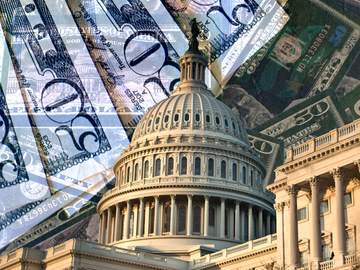
’Debt’
The word debt was on the minds of many people this week, after the United States approached, and then hit, the debt ceiling which had previously been set (and repeatedly raised) by Congress.
The US hit the debt ceiling set by Congress on Thursday, forcing the Treasury Department to start taking extraordinary measures to keep the government paying its bills and escalating pressure on Capitol Hill to avoid a catastrophic default.
— Tami Luhby, CNN, 19 Jan. 2023
The relevant sense of debt here is one that we define as “a specific sum of money or a performance due another especially by agreement (as a loan agreement).” Debt has a number of other meanings, most of which as related to the state of owing something, or to the thing that is itself owed. These meanings are all in line with the word’s background: debt comes to English from the Anglo-French dette, meaning “something owed.” Although the French word has no B in it, some people long ago thought it would be nice to add one to the English version, since the word could be further traced back to the Latin debitum, which does have a B. In English use the B in debt is not pronounced, and never has been.
’Manslaughter’
Manslaughter also trended in lookups, after prosecutors in New Mexico announced that they would be charging actor Alec Baldwin with two counts of this in connection with the death of a cinematographer.
Alec Baldwin and weapons handler to be charged with manslaughter in deadly ‘Rust’ shooting
— (headline) Los Angeles Times, 19 Jan. 2023
We define manslaughter, used on its own, as “the unlawful killing of a human being without malice.” There are multiple types of manslaughter, however; the kind Baldwin is charged with is referred to as involuntary manslaughter, which is defined as “manslaughter resulting from the failure to perform a legal duty expressly required to safeguard human life, from the commission of an unlawful act not constituting a felony, or from the commission of a lawful act in a negligent or improper manner.” For those who were wondering is manslaughter can also be voluntary, the answer is yes, and this type we define as “manslaughter resulting from an intentional act done without malice or premeditation and while in the heat of passion or on sudden provocation.”
’Preponderance’
Preponderance also spiked in lookups after the Supreme Court announced that they were unable to ascertain who had leaked the draft of a controversial opinion written by one of their members.
Eight months after Politico published its explosive leak detailing the draft of Justice Samuel Alito’s opinion that overturned Roe v. Wade, the court said its investigative team “has to date been unable to identify a person responsible by a preponderance of the evidence.”
— AP News, 19 Jan. 2023
Preponderance means “a greater amount or number of something” or "a majority." Preponderance of the evidence is a term we enter in our legal dictionary, and is defined as “the standard of proof in most civil cases in which the party bearing the burden of proof must present evidence which is more credible and convincing than that presented by the other party or which shows that the fact to be proven is more probable than not.”
’Affirmative action’
Another word that spiked in lookups as a result of the Supreme Court was affirmative action.
In cases against Harvard and the University of North Carolina, the Supreme Court is widely expected to overturn or roll back affirmative action in college admissions.
— Stephanie Saul, The New York Times, 15 Jan. 2023
We offer the following definition for affirmative action: “the use of policies, legislation, programs, and procedures to improve the educational or employment opportunities of members of certain demographic groups (such as minority groups, women, and older people) as a remedy to the effects of long-standing discrimination against such groups.”
In addition, our entry for this word has a note, which reads as follows:
”Affirmative action gives limited preference to qualified groups (which may include racial and ethnic minorities, women, older people, people with disabilities, and some veterans) in job hiring, admission to institutions of higher education, the awarding of government contracts, and other social benefits.”
Although the two words found in this entry have been used in conjunction for hundreds of years (referring to any action that was done in an affirmative manner), the sense that we define above dates in general use from the 1960s, after some federal policies of affirmative action were initiated under the administration of Lyndon Johnson. Occasional uses of affirmative action, used in reference to a policy to combat the effects of structural racism, may be found in the decades prior.
He called the recent position taken by the FHA, to omit reference to race, “a hands-off policy,” when the national need was for affirmative action.
— George Streators, The New York Times, 26 Jun. 1947
Words Worth Knowing: ‘Lip-worshiper’
Our word worth knowing this week is lip-worshiper, defined as “one that worships in utterance only : one affirming devotion or fidelity without corresponding action.” This word is presented for educational purposes only, and under no condition should you use it to make someone feel bad.




